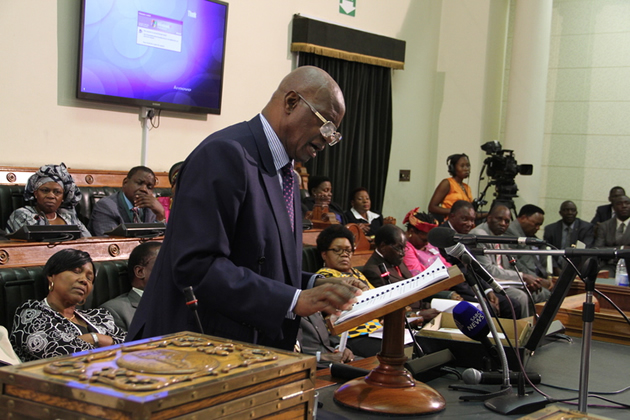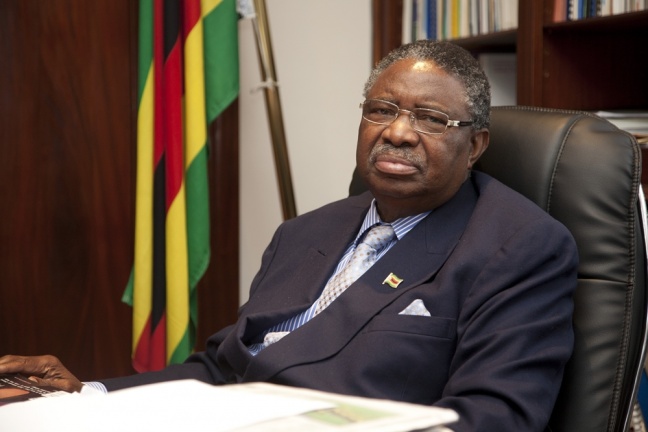Economy expected to grow 1,5pc

Martin Kadzere Senior Business Reporter—
FINANCE and Economic Development Minister Patrick Chinamasa has trimmed forecast for economic growth for this year, taking into account poor performance of agriculture. He also said price declines will continue prevailing, with average annual inflation for 2015 now projected at minus 2 percent against the original projection of minus 1 percent.
Presenting the 2015 Mid-Term Fiscal Policy Review Statement yesterday, the finance minister said the country’s economy is now expected to expand 1,5 percent this year, 1,7 percentage points below what he initially projected in December last year.
The World Bank lowered economic growth prospect to 1 percent this year, but will successively pick up steam in fiscal years starting next year to 2018.
The 1,5 percent growth rate is the slowest Zimbabwe will achieve since the dollarisation of the economy in 2009. Total revenue was revised from $3,99 billion to 3,6 billion
“Deceleration in overall economic growth signifies the contribution of agriculture, and the need for drought proofing the economy given adverse effects of climate changes,” said Minister Chinamasa. The sector is expected to decelerate -8 percent this year.
Agriculture performance for the 2014/15 season was below expectations, owing to the combined effect of the late onset of rains and its poor distribution, said Minister Chinamasa, adding that high cost of borrowed financing under the current environment of liquidity constraints was also an inhibiting factor. The impact was most severe on cereals, such as maize and small grains, said the minister.
During the first half, overall performance showed some modest growth, particularly in mining, manufacturing, tourism, construction, finances as well as public services.
“(The) slowdown in the economic activity will have a bearing on our public finances, as well as the balance of payments.
“This, in turn, undermines both domestic public and private investment which, respectively, are projected to contribute 2 percent and 11 percent to gross domestic product in 2015,” said Minister Chinamasa.
On inflation, the minister said the falling prices reflected in part, correction of domestic price structures, which had trended past hyper-inflationary pricing practices, relatively high labour costs, utilities, cost of borrowed capital and other costs of doing business.
He said the process of price alignment between Zimbabwe and those of its trading partners, particularly South Africa, should in the medium term boost the economy’s competitiveness, as inefficient sectors are forced by the market to adjust or exit.
There was an upward trend in mineral output during the first half of 2015, largely on the back of significant increases in gold, nickel, platinum and palladium production.
As such, the sector is expected to grow 3,5 percent from the initial projection of 3,1 percent.
The manufacturing sector is projected to grow by 1,6 percent, up from 1,2 percent in 2015. The recovery, though still subdued, is on account of sub-sectors in foodstuffs, drinks, tobacco, beverages, textiles and ginning, clothing and footwear as well non-metallic mineral products.
“There are signs of resilience at some companies, with capacity utilisation increasingly contributing to overall recovery and growth of manufacturing…and also signs of the emergence of some new business firms.”
The tourism sector is projected to grow by 5,1 percent, buoyed by aggressive destination marketing efforts. Tourist arrivals, though marginally down during the first quarter, are projected to reach two million by year end, from 1,8 million in 2014.
The marginal decline in arrivals during the first quarter of the year to 387 557 from 388 732 in the same period last year, was also against the background of contagion effects of the outbreak of Ebola, which has been perceived as affecting the entire continent.
The transport and communication sector is projected to register a positive growth of 3 percent, against 0,9 percent of 2014.
To attract FDI, the minister said failure to speak with one voice over critical policies, as well as failure to honour obligations will not unlock new financing.
He also said the Government has come up with special tariff for strategic minerals, irrigation, manufacturing and tourism.
The measures are expected to drive the growth in the wake of poor performance of agriculture.












Comments